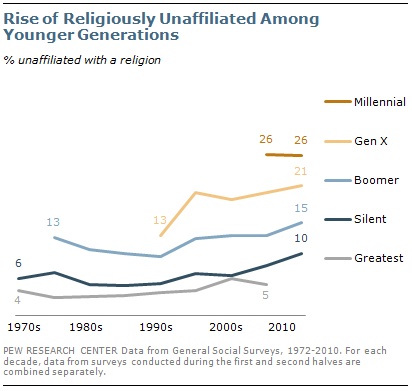In response to my request for any data on whether scientists get less religious with age, reader ‘wonderer’ sent me a link to a study that shows that older scientists are less religious than younger ones.
When we combine this data with that of another study that I reported on earlier that compares levels of religious belief in the general population based on their year of birth, a clear picture emerges that it is likely science that is causing older scientists to become less religious.
Although the age range brackets in the two studies do not exactly overlap, it is close enough so that for the first study (done in 2009) the 18-34 range consisting of people born 1975-1991 could be classified as Millennials; the 35-49 age range was born in 1960-1974 and are Gen Xers; the 50-64 age range was born in 1947-1959 and are roughly Boomers; and those 65 and above were born before 1946 and are the Silents.
So the trend of lower levels of religiosity of scientists with increasing age is opposite to that of the general population, strongly suggesting that it is increasing knowledge of science that is the key factor in driving disbelief.



The second graph would also likely explain why the xtian fundies are becoming so aggressive in public policies now. Those are some staggering percentages for both the gen Xers and the millennials.
I would think that the internet is a large contribution to this. It allows nearly everyone who looks to have easy convenient access to science information. Being a Gen Xer myself, trying to educate myself in things such as religion and science got substantially easier when the internet became such a big part of life…consistent with the trend in that graph.
Am I misreading the second graph? It appears to me that the general public get slightly less religious as they get older, that they go in the same direction as the scientists but to a lesser degree. Overlaid of course is the fact that the lines representing the younger ones are higher on the graph, meaning that as the older generations are replaced by the younger ones religious affilliation is likely to decline.
You are correct, that there is a very slight decrease in religiosity as people get older.
I wonder why chemists are so religious?
Interesting question! I have no idea. Perhaps it is because chemistry is the one discipline that historically hasn’t run afoul of religion. Biology has had evolution, geosciences has had the age of the Earth, and physics has had cosmology, all of which caused high-profile problems for religious beliefs, causing some practitioners to have to choose.
As far as I know, there is nothing in the history of chemistry that contradicted religious teachings in any obvious way.
That’s the best I can do and is probably wrong but it was fun to speculate.
Speculating is always fun! Just keep in mind that it remains speculation. It’s nice to see my speculation on Einstein being confirmed on a general level. It doesn’t necessary mean that my speculation was correct in his particular case; perhaps it makes it more likely.
If I might extend that explanation: I think it’s because chemistry is such an applied science. It doesn’t (generally) require the sort of theoretical scrutiny that biology and cosmology do. I think it’s much easier for a chemist to take an instrumental approach to theory and think of the entities (i.e. atoms, electrons, molecules) simply as useful conceptual devices.
This would explain why chemistry hasn’t historically run afoul of religion: the theoretical foundations aren’t constantly expanding and squeezing god into tighter spaces. It also sets up a greater likelihood for compatibility with “alternative” cosmological viewpoints (i.e. creationism).
As one of the `silents’, I didn’t even know I was a skeptic, critical thinker, etc., and had been one all of my life, apparently, and was surprised to learn since the internet that so many other people were, too, and that it was a `thing’.
It’s just not something that was ever an issue, well, to me, anyway, and maybe for others too, and therefor the `silence’…
Putting some communion crackers through mass spectroscopy might help with that.
Or more attention to the question of turning water into wine without going through the irrigate-grapevines(etc) step.
Then there’s that Shroud thing…
Maybe they include all chemists, not just scientists? E.g., chemical engineers.
Kinda sorta yeah. http://en.wikipedia.org/wiki/Silent_Generation
I think it is interesting also that “Biological and Medical” were nearly as low as chemists. I wonder if separating biologists from medical professionals would indicate that medical professionals are more likely to be believers. I have worked over the years with many doctors and I am married to a registered nurse. I find that these professionals tend to be a very spiritual group. I have always speculated that this is because they need to find a source of hope in circumstances where being hopeful isn’t the logical state of mind…
My brains are sometimes a bit slow, so only today I wondered if the reverse its true as well. There are and have been religious scientists. Max Planck is sometimes mentioned. There is also Jonathan Sarfati, who has a Bsc in chemistry and has published in Nature.
Now it’s my impression that they basically both stopped with their scientific work when they became religiously active. Are there any data about the hypothesis that coming out of the religious closet has a negative impact on scientific output?
I don’t know that there is a religious closet for scientists. I have worked with scientists all my life and religion is largely irrelevant. It is rarely a topic of discussion. I have known scientists who are religious because they happened to casually mention mention going to church or temple or something. Although most scientists are not religious, being religious was not frowned upon. Nobody really cared. All they cared about was the quality of the science you produced.